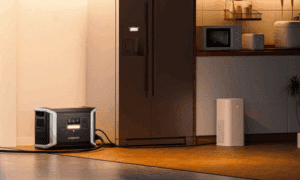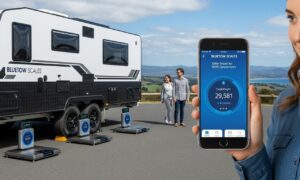When considering the best home generators for power outages, two main types come to mind: portable generators and standby generators. A portable generator is ideal for temporary use, providing backup power for essential devices and power tools during an event of a power outage. These generators typically run on gas or propane and are easy to transport. On the other hand, a home standby generator connects directly to your home’s power system through a transfer switch, automatically turning on during a blackout to supply whole home power. For those seeking a more sustainable option, solar generators and home battery backup systems can serve as reliable power solutions.
When choosing the right generator for your needs, consider power output and fuel type. Inverter generators are excellent for home use, providing clean AC power suitable for sensitive electronics. Additionally, natural gas generators offer a convenient fuel source for home backup systems. Consulting a generator buying guide can help you choose the best option tailored to your power needs. Whether you require a house generator for backup power during outages or a portable solution for outdoor activities, selecting the right generator is essential to ensure you have enough to power your entire home or essential appliances.
What kind of generator do I need to power my whole house?
When considering what kind of generator you need to power your whole house, it’s essential to evaluate the size of your home and how much power you need. Different types of generators are available, including backup generators and portable power stations, each with varying capabilities. A generator to power your home should match your energy requirements, typically measured in watts, to provide power for essential home appliances during outages. For those who want to restore power quickly, a Generac home generator is a popular choice, as it can seamlessly connect to the power grid.
When selecting a new generator, consider the type of fuel required, as propane generators are efficient and widely used for emergency power. However, it’s crucial to ensure that the generator is right for your needs and is placed outside to avoid generator exhaust and carbon monoxide risks. Additionally, a backup battery can serve as a reliable power source for portable home setups, providing an extra layer of safety and convenience. Whether you choose Canter Power Systems or another provider, understanding your specific needs will help you select the best solution to keep your home powered during outages.
New to Home Power Backup?
When considering a generator to power your whole house, it’s essential to understand the different types of generators available. A backup generator is a popular choice for homeowners, especially when the power goes out, as it can restore power quickly. These generators can either be stationary or portable power solutions, depending on your needs. If you have a larger home, you might require a larger size generator that can provide enough power for your home and support essential home appliances. Fuel type also matters; propane generators are a reliable option, while backup battery systems can serve as an auxiliary power source.
Safety is paramount, so it’s crucial to never use a generator indoors due to the risk of carbon monoxide poisoning from generator exhaust. Brands like Generac Home and Canter Power Systems offer various models tailored to specific needs. Assess how much power you need based on the size of your home and the home appliances you want to run. A new generator can keep your home running smoothly during outages and provide peace of mind as an emergency power source.
Is a Home Generator Worth It?
Choosing the right generator to power your whole house involves understanding the different types of generators available. A backup generator can automatically kick in when the power goes out, providing a reliable power source to keep your home running smoothly. When selecting a generator, consider how much power you need based on the size of your home and the home appliances you want to power. Propane generators and portable power stations are popular options that can provide power during emergencies. However, it’s crucial to avoid using a generator indoors due to the risk of carbon monoxide poisoning from generator exhaust.
If you want to keep your home functional during outages, a new generator from brands like Generac home or Canter Power Systems can restore power effectively. Additionally, a backup battery can store energy for times when you need emergency power. Assess the size generator you need to supply power for your home efficiently. Ultimately, finding the right generator will ensure your family stays safe and comfortable, no matter the circumstances.
How Much Power Do I Need?
Choosing the right generator to power your home involves understanding the different types of generators available. If you want a reliable source of energy when the power goes out, a backup generator is ideal. These generators can provide power for essential home appliances and restore power quickly. Consider how much power you need based on the size of your home and the specific power source required. A size generator that meets your needs will ensure you have enough emergency power during outages.
When selecting a new generator, think about the type of fuel it uses. Options like propane generators are popular, while portable power stations can offer flexibility. It’s crucial to avoid using a generator indoors due to the risk of carbon monoxide poisoning. Brands like Generac home and Canter power systems provide reliable choices that can keep your home running smoothly during an outage. Ultimately, the right generator to power your home will depend on your unique energy needs and preferences.
Will a 20k generator run a house?
When considering whether a 20k generator can power an entire home, it’s essential to assess your energy needs. A 20k generator can typically provide enough generator power to run most household appliances, including essential circuits in your home, while also offering extra power for additional devices. This makes it a suitable option for those looking for permanent backup power for their home or business.
However, the type of generator you choose plays a crucial role in how effectively it can power a whole home. Both gas and propane generators have their advantages, so it’s vital to consider the generator size and the amount of power you will need. When buying a generator, ensure you also think about maintaining your generator to keep it running efficiently, especially during emergencies when running a generator becomes necessary.
Types of Generators, Power Sources, and Portable Power Solutions
Generators come in various types and sizes, each designed to meet specific power needs and applications. Understanding the different types of generators, their power sources, and how much power they can provide is essential when selecting the right generator for your home, business, or portable power needs. Here’s an overview of the main types of generators, their power sources, and considerations for choosing the appropriate power system.
Types of Generators
- Standby Generators:
- Description: Permanently installed and connected to a building’s electrical system, standby generators provide automatic backup power during outages. They start automatically within seconds of a power loss and can power an entire home or business.
- Power Source: Typically fueled by natural gas, propane, or diesel.
- Power Capacity: Ranges from 7 kW to over 150 kW, capable of powering everything from essential circuits to large commercial operations.
- Applications: Ideal for homes, businesses, hospitals, and facilities that require uninterrupted power.
- Portable Generators:
- Description: Mobile units that can be moved and used in various locations. Portable generators are commonly used for emergency backup, outdoor events, construction sites, and recreational purposes.
- Power Source: Usually powered by gasoline, propane, or diesel.
- Power Capacity: Typically, between 1 kW to 15 kW, suitable for powering essential appliances, tools, and lights.
- Applications: Great for temporary power needs, camping, tailgating, and as a backup for smaller homes.
- Inverter Generators:
- Description: A type of portable generator that produces clean and stable power suitable for sensitive electronics. Inverter generators are known for their quiet operation and fuel efficiency.
- Power Source: Runs on gasoline or propane.
- Power Capacity: Usually between 1 kW to 7 kW, suitable for powering small appliances, electronics, and lights.
- Applications: Ideal for camping, RVs, and as a backup for small household needs.
- Solar Generators:
- Description: Solar generators use solar panels to capture energy from the sun and store it in batteries for later use. They provide clean, renewable power without fuel or emissions.
- Power Source: Solar panels charge the internal battery, which then supplies power.
- Power Capacity: Typically ranges from a few hundred watts to several kilowatts, depending on the system size and battery capacity.
- Applications: Great for off-grid living, emergency backup, and as a sustainable power source for homes and portable needs.
- Dual-Fuel Generators:
- Description: Dual-fuel generators can run on two types of fuel, typically gasoline and propane, providing flexibility and extended run times.
- Power Source: Gasoline and propane.
- Power Capacity: Usually between 3 kW to 10 kW, depending on the model and fuel type used.
- Applications: Suitable for home backup, outdoor activities, and situations where fuel availability may vary.
Power Sources
- Gasoline: Commonly used for portable and inverter generators. Gasoline is widely available but has a shorter shelf life and higher emissions compared to other fuels.
- Propane: Clean-burning and easy to store, propane is a popular choice for both standby and portable generators. It has a longer shelf life than gasoline and produces fewer emissions.
- Natural Gas: Often used for standby generators, natural gas provides a continuous fuel supply via a direct connection to the home’s gas line. It’s convenient and clean burning but may be unavailable in remote areas.
- Diesel: Known for its efficiency and reliability, diesel is commonly used in commercial and industrial generators. Diesel generators are fuel-efficient and durable but can be noisier and produce more emissions.
- Solar Power: Solar generators harness energy from the sun, providing a renewable and eco-friendly power source. Solar power requires no fuel and produces no emissions, but its effectiveness depends on sunlight availability and battery capacity.
Power Capacity: How Much Power Do You Need?
Determining how much power you need from a generator depends on the size of your home or business, the number of appliances or systems you want to keep running, and your overall power consumption during an outage. Here are some general guidelines:
- Small Generators (1-3 kW): Suitable for basic needs like charging devices, running small appliances, and providing light. Ideal for camping, tailgating, and small emergency backup.
- Medium Generators (4-9 kW): Can power essential household items such as refrigerators, sump pumps, lights, and some home heating or cooling. Great for small to medium-sized homes.
- Large Generators (10-20 kW): Capable of powering most household appliances and systems, including central heating and air conditioning, well pumps, and large kitchen appliances. Suitable for whole-house backup in larger homes.
- Extra-Large Generators (21 kW and above): Designed for large homes, businesses, or critical facilities that require extensive power. These generators can handle high loads and provide reliable power for all systems.
Portable Power Solutions
Portable power stations, also known as battery-powered generators, offer a versatile and eco-friendly alternative to traditional fuel-powered generators. They use lithium-ion batteries to store energy, which can be charged via AC outlets, car chargers, or solar panels.
Benefits of Portable Power Stations:
- Silent Operation: Unlike gas or diesel generators, portable power stations operate quietly, making them suitable for indoor use.
- No Emissions: They produce no harmful emissions, making them environmentally friendly and safe to use indoors or in enclosed spaces.
- Versatile Charging Options: Can be recharged using various methods, including solar panels, which add to their sustainability.
Applications:
- Home Backup: Suitable for small-scale backup needs during short outages.
- Outdoor Activities: Perfect for camping, tailgating, or outdoor events where silent and emission-free power is desired.
- Emergency Power: Provides a convenient and portable option for powering essential devices during emergencies.
Conclusion
Choosing the right type of generator and power source depends on your specific needs, preferences, and budget. Whether you need a highly efficient standby generator to power your entire home, a portable unit for outdoor activities, or a renewable solar-powered system, understanding the capabilities and limitations of each type will help you make an informed decision. By considering the power capacity required, fuel availability, and desired features, you can select the best backup power solution to keep your home, business, or outdoor adventures powered and prepared for any situation.
Read More From Techbullion




































